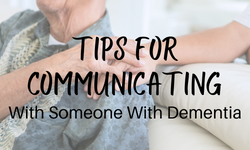
Communication is an important part of life. It helps maintain relationships, build trust, and resolve conflict. A person with dementia needs to experience communication to preserve their self-worth and quality of life. However, talking and communicating with someone with dementia can become challenging.
The most common symptom of dementia is memory loss. Someone with dementia can be forgetful and sometimes struggle to find the right words to say. This can make conversations challenging. Talking and communicating can become even more tricky if they are experiencing other symptoms of dementia such as confusion, mood swings, or agitation.
According to the National Insitute on Aging (NIA), effective communication can help build satisfying relationships. Nevertheless, communicating is difficult for someone with dementia because they have trouble remembering things. Fortunately, there are ways to help make communication easier. Here are some tips for communicating with someone with dementia.
Pay attention to your body language and use physical contact when appropriate.
-Body language is shown through nonverbal signals such as facial expressions, tone of voice, body posture, and gestures. A smile and calm voice signals openness and positive emotions. Consider the gestures you may be using. For example, pointing or shaking your finger at someone implies negative feelings. You may find it helpful to limit gestures while speaking with someone with dementia.
-Physical contact may be used as a sign of affection and can create feelings of security. If you notice the person with dementia is feeling sad or nervous, offer comfort by squeezing their hand or placing your hand lightly on their arm. Emotions can change quickly so make sure to approach physical touch with caution.
Avoid distractions and keep things simple.
-Limit visual and audio distractions by turning off background noise such as the TV or radio. These things can make it difficult to hear and concentrate.
-Use simple words when speaking and wait a few seconds for a response. Ask one question at a time to not overwhelm a person with dementia. If they struggle to respond, try communicating with more statements and fewer questions. For example, say ‘we are going for a walk’ instead of ‘would you like to go for a walk?’.
-Visuals are a great way to help navigate a conversation. For example, show a peach and a banana to a person with dementia when asking which one they would like for a snack.
Enjoy your time together and take a moment to reminisce.
-A person with dementia can remember events from many years ago and these memories are very precious to them. Talk or ask questions about these memories. Look at photos that trigger positive memories.
-If a person with dementia remembers something incorrectly, don’t worry about correcting them. This may lead to confusion or agitation. Instead, turn the conversation to something else.
Finally, remember to be patient.
-Someone with dementia may require a change to the way they would communicate before symptoms of dementia began. As symptoms progress, more communication challenges may be present and additional changes may be needed. If you are feeling frustrated, it is okay to take a break. Consider starting with some small changes, such as limiting background noise during conversations, to help maintain positive relationships and keep stress levels minimal.